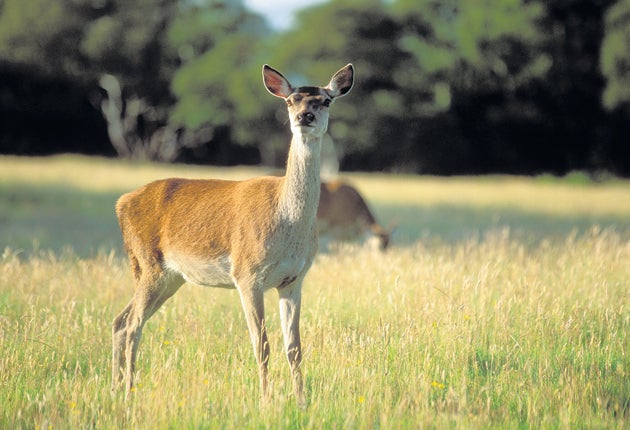Roe deer become target for urban hunters out to make a quick buck
Glasgow is the new focus of a dramatic upsurge in the poaching and baiting of wildlife. Cahal Milmo reports

The deer carcasses bore the tell-tale marks of a vicious dog attack that are found on other wild animals killed in Britain's growing trend for illegal hunting. What made them different was that these mutilated creatures were discovered in the suburbs of one of Britain's biggest cities, not woodland.
The five roe deer have been found during the past month in Bishopbriggs, a Glasgow suburb, after being chased to their deaths by a pack of lurcher-type dogs owned by urban gangs who pursue their quarry on to golf courses and urban streets as part of a dramatic upsurge in poaching and baiting of wildlife.
Golfers and walkers in Glasgow's commuter belt have been confronted with the cadavers of slaughtered roe deer hanging in trees, left behind by hunting "joyriders" who use dogs to "course" or harry the animals for entertainment, often before killing them and stripping them of their meat for sale on the black market as venison.
In one incident, a family in Glasgow's East End woke to find the eviscerated remains of a dead deer hanging from their washing line.
Police and animal protection charities said the practice was part of a wider increase in attacks across Scotland, England and Wales on prey from badgers and hares to salmon and pearl mussels, by organised gangs who seek to profit from illegal dog-baiting contests, or those who sell on poached animals in the depths of the recession – the value of venison has risen, for instance.
A spokesman for the Scottish Rural Property and Business Association said: "Poaching is particularly common on the urban fringes. It's people going out with dogs, guns or crossbows for the hell of it. Salmon poaching is also on the increase. This is not a case of stealing one for the pot: it's on an industrial scale. Fish traps that hold a dozen or two dozen fish at a time are being taken."
Teenage gangs were blamed for a spate of deer deaths in the west and east of Glasgow, using dogs and air rifles to corner and kill roe deer driven from parks and woodland on the edge of the city. Strathclyde Police warned that the hunting has moved to golf courses in Milngavie and Bearsden, two desirable suburbs in north Glasgow, as well as Bishopbriggs.
Tom Gatherer, deputy-chief superintendent of the Scottish Society for the Prevention of Cruelty to Animals (SSPCA), said: "The deer in these areas, although wild, are used to seeing people out playing golf or walking their dogs. The people involved in this activity are getting easy pickings."
Conservationists said the increase was connected to a desire to make hard cash from illegal hunting. Police in South Wales confirmed last week that they were investigating the discovery of a deer carcass found in a motorway layby near Cardiff which had been butchered for sale as meat.
Two Scottish police forces have announced a joint crackdown on poachers operating on the River Spey, where a fresh salmon can be worth up to £100 on the black market and a freshwater mussel pearl can fetch anything from £10 to several hundred pounds.
PC Charles Everitt, an investigative support officer with the UK National Wildlife Crime Unit, said: "Deer poaching and hare coursing are very prevalent with those involved travelling across force areas to do it. With deer poaching, it's an acquisitive crime. The carcass can be valuable if sold on, and that may be particularly attractive in this economic climate."
At the same time, there is growing evidence of an increase in illegal hunting and baiting in the countryside.
A badger conservation group said it had recorded 70 attacks on the animals so far this year, a figure which is two-thirds of the total for 2008. Scottish Badgers said a quarter of the incidents involved badgers which had been dug out of their setts and put immediately into fights against a group of dogs.
Campaigners believe the practice is being carried out across the Borders region of Scotland and northern England by gangs based in both countries.
Ian Hutchison, species protection officer for Scottish Badgers, said: "We are aware that there are groups moving across the border from the north of England and vice versa to carry out this activity against badgers.
"Our experience is that if they are involved in one form of illegal hunting then they will be involved in the others as well as general criminality... we have found we are dealing with people who have hundreds of convictions."
The SSPCA said it had presented evidence to the authorities concerning suspected hunt organisers after finding dogs with injuries consistent with poaching and baiting. When dogs fight with badgers they suffer distinctive injuries caused when the badger attacks the area under its opponent's throat.
Chief Superintendent Mike Flynn said: "The sickening and bloodthirsty practice of badger baiting and deer and hare coursing is on the increase in Scotland... The motive is predominantly pleasure. The individuals take great enjoyment in watching their dogs run an animal down and then maul it to death."
Join our commenting forum
Join thought-provoking conversations, follow other Independent readers and see their replies
Comments
Bookmark popover
Removed from bookmarks